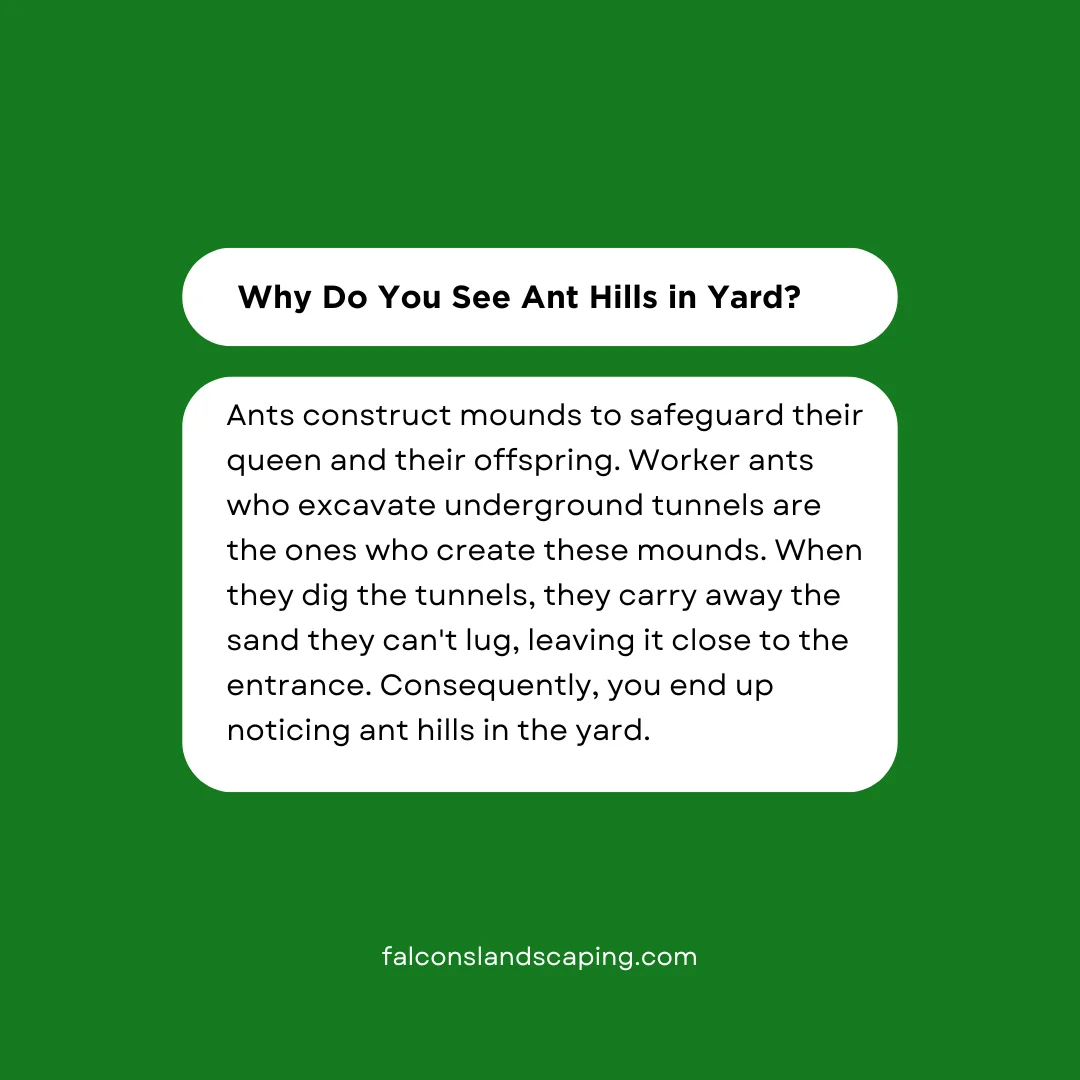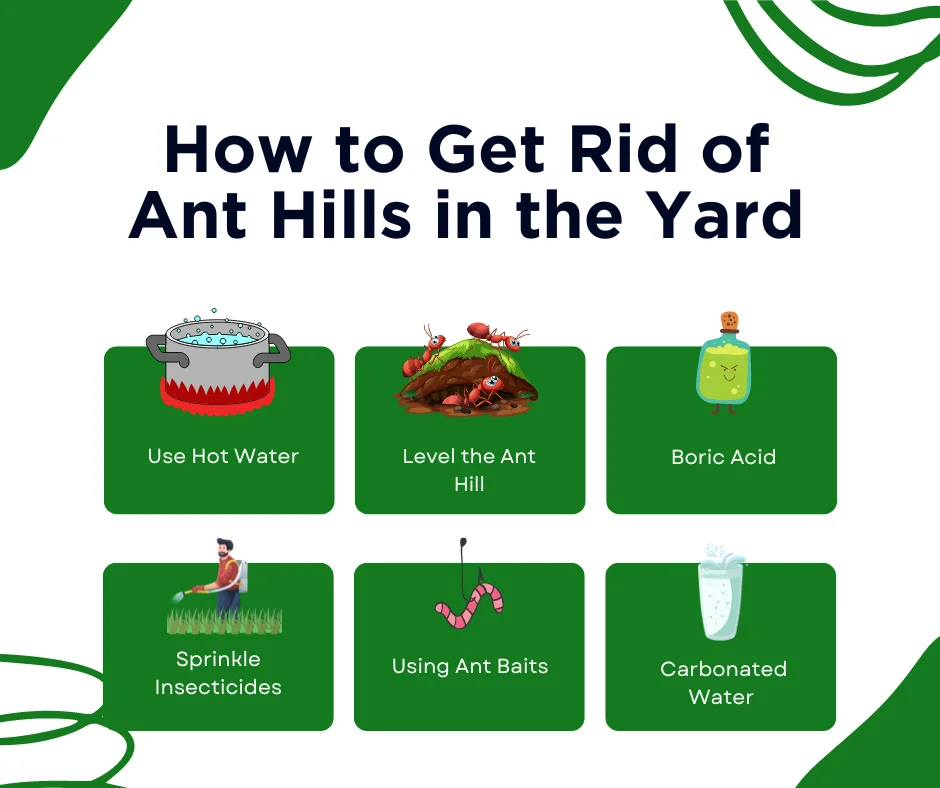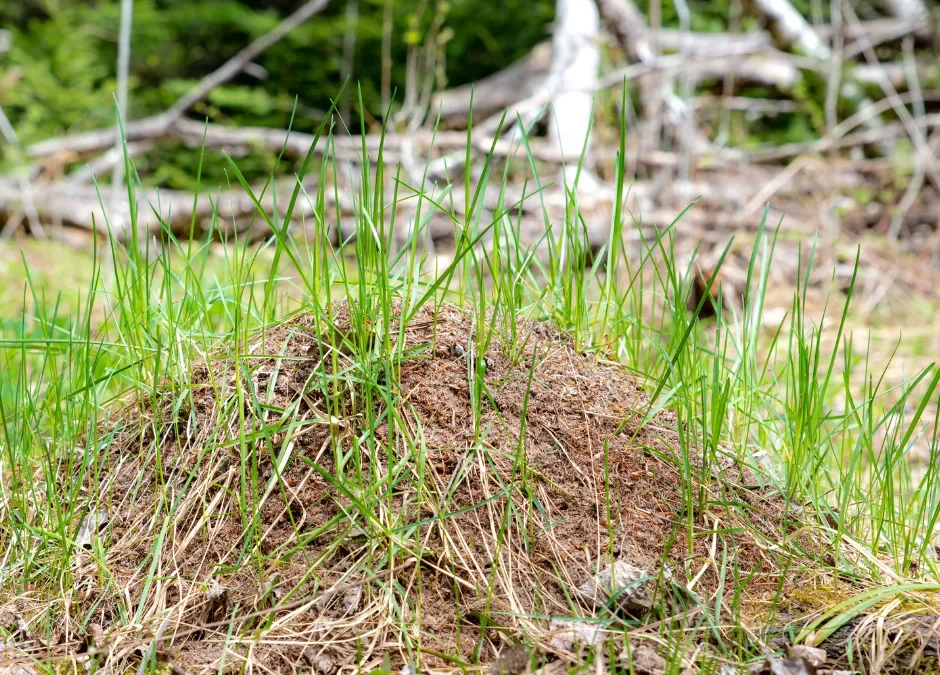Have you noticed piles of dirt around your home? Or are there mounds of sand in the yard?
Then, you are dealing with ant hills in the yard. It may look fascinating to you how ants build shelters for their colonies. But mind you, these colonies can destroy your yard.
If the colony becomes huge, more ants will dig your yard, weakening the root system.
Whether you want to protect your yard from an unsightly look or damage, you need to learn how to get rid of huge ant hills in your yard.
So, let’s get started!
Related Blog: Effective Ways to Eliminate Ants in the Garden
Why Do You See Ant Hills in Yard

Ants construct mounds to safeguard their queen and their offspring. Worker ants who excavate underground tunnels are the ones who create these mounds.
When they dig the tunnels, they carry away the sand they can’t lug, leaving it close to the entrance. Consequently, you end up noticing ant hills in the yard.
You may notice ant hills in the yard for a number of reasons.
If you have decaying wood in the house, the ants may be using it as a residence to carry on their search for food or water.
Ants are most busy in late spring and early summer, so they enter homes most frequently at those times.
Whether you’re dealing with outdoor or indoor ants, it’s preferable to destroy the colony rather than just swatting them away.
Each colony can contain hundreds or thousands of ants.
If left unchecked, ant colonies grow rapidly, turning a small issue into a nightmare in no time. Soon, you will find yourself searching for ways to get rid of huge ant hills in the yard.
What Constitutes Ant Hills?
Ant hills in a yard are built from sand, dirt, and small branches. Stones and gravel are too heavy for ants to carry, so you won’t find them in the ant hills.
The construction of ant hills in a yard is quite strategic. They use twigs to strengthen their building and improve its weather resistance.
Ants may utilize seeds that sprout and grow from their ant hills, which makes the hills blend in with the surroundings.
Ant hills in a yard are a strong and safe place for them to live.
How to Get Rid of Ant Hills in Yard

If you want to learn how to get rid of ant hills in the yard, here are all the effective and simple ways to make this task a piece of cake for you.
1. Use Hot Water
Boiling water over an ant hill is one of the simplest ways to remove ant hills in the yard.
To make it happen, you just need to use enough water in one go to ensure that every single ant gets affected by it.
Normally, pouring two to three gallons of boiling water should be enough to remove the ant hills.
2. Level the Ant Hill
Ant hills can be flattened off with a rake or other gardening equipment. This is another way to get rid of ant hills in the yard.
Ants will quickly leave an area if you destroy an ant hill and level the ground. They get signals to them that it is no longer safe for them.
Learn More: Stink Bug in Ontario: Things You Need To Know
3. Boric Acid
When used correctly, boric acid is another technique that can be useful for eliminating ants.
To experiment, just combine equal parts of boric acid and a sweet substance like peanut butter or corn syrup with water.
The sweet substance will attract the ants, and they will carry it back to the ant hills in the yard.
After ingesting the mixture, ants usually die 24 to 48 hours later.
4. Sprinkle Insecticides
If you have ant hills in the yard, you may want to try using insecticide since it is particularly effective at eliminating ants and their eggs.
A pesticide called Bifen L/P granules targets the central nervous system of ants upon ingestion.
Using a regular fertilizer spreader like Bifen L/P grains can be applied on ant hills in the yard or any other area where ants travel to destroy them.
Learn More: Pest Control Organic Methods: Protect Your Lawn & Family
5. Using Ant Baits
Ant baits come in a range of varieties and are frequently used to kill ants and remove the ant hills in the yard.
Bait stakes are a popular kind of ant bait used to kill ants both below and above ground. You can simply place them on the ground.
You can use several kinds of ant baits within your house. These baits release a poison that is inaccessible to children or pets and that is carried back to the ant colony by the ants who are affected by the poison.
6. Carbonated Water
It is widely recognized for its effectiveness, especially when it comes to eliminating ants from the lowest levels of ant hills in the yard.
The purpose of the CO2 is to completely remove all oxygen from the area where the water will be discarded.
The reaction suffocates the ants deep within the ground.
7. Get Liquid Soap
You can use Borax liquid soap if it’s easily available in the region where you live. If not, you can work with any dish soap to get rid of the ant hills in the yard.
By combining soap with water, you will have two possible outcomes on the ant hills in the yard.
If the concussion is hot enough, there would be enough water to melt their house and drown the colony.
Secondly, the ants will struggle to escape the method because of the stickiness of the soap.
8. Vinegar
When trying to eliminate ant hills in the yard with vinegar, keep in mind that it can kill weeds and may damage nearby vegetation.
To make a solution, mix equal parts water and vinegar. Pour it into the tunnels of the anthill. This remedy will leave your property free of ants.
9. Gather Citrus Peels
If you have ant hills in the yard, start drying and saving citrus peels, such as lemon, lime, grapefruit, oranges, etc.
These peels contain acidic oil that is toxic for the ants living in the ant hills in the yard.
Dried peels should be ground into a powder in a food processor or grinder.
In places of the house where ants penetrate, scatter powdered peels.
10. Oil Application
Ants are repelled by essential fragrances such as citrus, tea tree, and peppermint. So, you can use them to get rid of the ant hills in the yard.
Similarly, you can mix fifteen drops of tea tree or peppermint oil, seven drops of citrus oil, or 1/4 cup of water.
Shake well and mist baseboards, windowsills, and any other areas of your house where ants may have entered.
Alternatively, to keep ants out of cabinets or pantry areas, stuff cotton balls with a few drops of orange, lemon, or peppermint oil.
11. Add Spice
Ants are not fond of the strong fragrance of cloves, cayenne pepper, bay leaves, black pepper, or spicy cinnamon.
Putting spice in the anthill in the yard will make their stay uncomfortable and force them to relocate.
You can also create a mixture of water and ground spices and pour it down the anthill’s entrance and exit.
12. Pour Water Over the Ant Hill
It’s possible to successfully kill ants within an ant hill by flooding it but to maximize the effect, pour a stream of water constantly for a couple of minutes.
You can eliminate ant hills and many of the ants within them by hosing them down with a garden hose for a short while.
How To Prevent Anthill in the Yard
Treating your property early and frequently is the best way to prevent ant hills and colonies from sprawling on your property.
Usually, ants spend the winter in their colony and go foraging in the spring. While some species have wings to aid in their dispersal, others swarm to locate their new colony.
Ants strategically locate their colonies in areas that will provide them with safety and defense against their enemies.
They select areas like inside tree logs, beneath stones, and between tree roots, among others.
Prepare insecticide sprays, granules, and bait stations beforehand. This will help you kill the colony before it has a chance to grow.
Nevertheless, by treating your ants at the earliest, you can stop a future spread even if it is later in the season.
Keep in mind that the winter and late fall are when ants are most inactive. Treatment will be easy if you wait till the colony starts acting up again in the early spring.
Treating these colonies is considerably more difficult because they don’t consume much.
Learn More: 11 Spring Lawn Care Steps to Follow in 2024
Why Are You Facing the Issue of Ant Hills in the Yard
A multitude of factors may contribute to the appearance of ant hills in the yard.
Examine these factors to determine what makes your home so appealing to ants, and you’ll be able to take action to eradicate them forever.
The factors that encourage ant hills in the yard are as follows:
Seepage of water from a leaky plumbing system is one likely cause of ant hills in the yard.
Ants will be lured to seeping water in the garden because it leaves a scent trail for other ants to follow.
Your soil provides them with a secure place to stay. Ants prefer sandy soil or other dry, well-drained soil.
They also benefit from an abundance of sunlight. If your garden has dry, patchy areas, you may notice ant hills growing there.
If the particles in your soil are large and the ants can easily move them, more ants will try to colonize there.
Lastly, if your waste bins are outside, especially in the backyard, you may encounter ants more frequently. Fruit, fungus, vegetables, cereals, and nuts are other potential food sources in your garden or outdoor space.
FAQs
Are ant hills killed by bleach?
It is true that bleach works to kill ants. Therefore, if you pour bleach on top of ant hills in the yard, it will destroy the colony. The liquid bleach will disrupt the ants’ breathing when it comes into contact with their exoskeletons.
Do ant hills cause harm to grass?
Ant hills can quickly harm lawns by suffocating the grass, blocking the growth of new growth, and ultimately resulting in brown patches. When cutting your lawn this summer, remember that ant mounds can harm lawn mower blades.
What is the right way to use borax to remove ant hills in the yard?
Blend one and a half cups of warm water, half a cup of sugar, and one and a half Tbsp borax. After soaking some cotton balls in the liquid, place them close to the ant colony. Sugar will attract the ants and they will carry the borax back to their house.
In Conclusion
Your lawn can be a fantastic site for ant hills in the yard.
When there is plenty of food in the surroundings, ants construct their hills in the direction with the most sunlight.
Using our tips on how to get rid of ant hills in the yard, you can restore your yard’s original aesthetic.
However, the ant problem doesn’t take much time to become severe. If you discover ants in every nook and corner of the house, contact a professional.
With the best lawn care practices, they will guarantee that your lawn is a safe haven for plants and your family, not any pesky creature.

